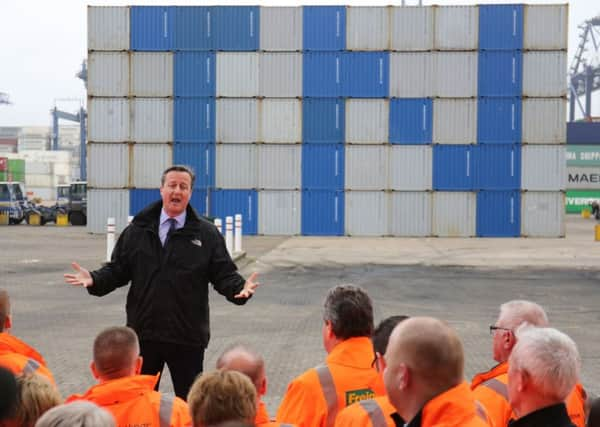YP Comment: PM likened to '˜car salesman'. Former MP criticises EU tactics


Like many, Mrs Peacock favoured closer trading ties with Europe – but was opposed to the creation of a European super-state which could determine UK policy from Brussels. And, while Mr Major’s concessions hard-won concessions and ‘opt outs’ were sufficient – just – to persuade the then Batley and Spen MP to back Maastricht in a series of knife-edge Parliamentary votes in the early 1990s, she’s now close to switching sides and backing Brexit.
Her reasons – set out in an article for The Yorkshire Post – go to the core of the debate and will make difficult reading for David Cameron. She believes that the Prime Minister should have stayed neutral after his renegotiation, not least so senior Cabinet Ministers did not feel pressurised to back the Remain campaign out of loyalty to the Tory leader, and that his attempts, thus far, to sell his reforms compare unfavourably to a “second hand car salesman trying too hard to sell a suspect vehicle”.
Advertisement
Hide AdAdvertisement
Hide AdIt’s a damning indictment indicative of the public’s growing mistrust of not just the Tory leader, but the political elite per se. If Mr Cameron, and his colleagues, cannot give the electorate positive reasons to vote in favour of EU membership without resorting to the scare-mongering which has characterised both sides of the campaign so far, how does he expect to win the referendum on June 23? Perhaps he should use Mrs Peacock as a sounding board. For, judging by her comments, she will be voting No unless the Prime Minister can now assure her, at the very least, that the EU – and European leaders – will honour their promises to the UK. Over to you, Mr Cameron.
Keys to the future: Transport and skills are linked
LIKE the aforementioned Elizabeth Peacock on Europe, Transport for the North chairman John Cridland is extremely well qualified to comment on George Osborne’s Budget because he was previously director-general of the CBI.
It is expertise that can only be beneficial to the region which has struggled to punch above its collective weight for too long. If the Northern Powerhouse is to become a reality, it will require leaders in this region, like Mr Cridland, taking ownership for implementing key policies.
His keynote speech at yesterday’s Fastest 50 business awards in Leeds was noteworthy for two key points. First, Mr Cridland said a new road tunnel under the Pennines, dismissed by some as ‘pie in the sky’, had the potential to bring 15 million people closer together and forge one economy for the North.
Advertisement
Hide AdAdvertisement
Hide AdSecond, he said that proposed infrastructure improvements will not yield the projected dividends unless business and education leaders work together on the issue of skills. Again this is not new – it remains a source of embarrassment that this county’s exam results remain the worst in the country.
Yet, given Mr Cridland’s belief that skills and transport are inter-connected because it should, in time, become easier for well-qualified young people to travel longer distances for career opportunities, the challenge is ensuring that Yorkshire’s political leaders do not lose sight of this requirement when they do broker a devolution deal. It holds the key to this region’s future.
In the driving seat: Time to put rail passengers first
AS part of the improvements promised by Virgin Trains when awarded the franchise for the East Coast main line, the new trains launched by Sir Richard Branson should, hopefully, lead to faster – and more reliable – services. If this happens, it will also lessen the likelihood of travellers having to go through the rigmarole of applying for compensation when trains are late – or cancelled.
As the Office of Road and Rail regulator has now confirmed, the whole complaints process appears to have been designed to make it as difficult as possible for passengers when they’re inconvenienced. This is wrong – and it’s now up to Virgin, and its competitors, to provide travellers with the type of service that entrepreneurs, like Sir Richard himself, would expect to take for granted.
Advertisement
Hide AdAdvertisement
Hide AdAfter all, the railway industry is a public service that is heavily subsidised by the taxpayers. Rather than treating passengers as an inconvenience, it’s time that their needs are put in the driving seat – especially on those occasions, still relatively rare, when trains are delayed or cancelled.